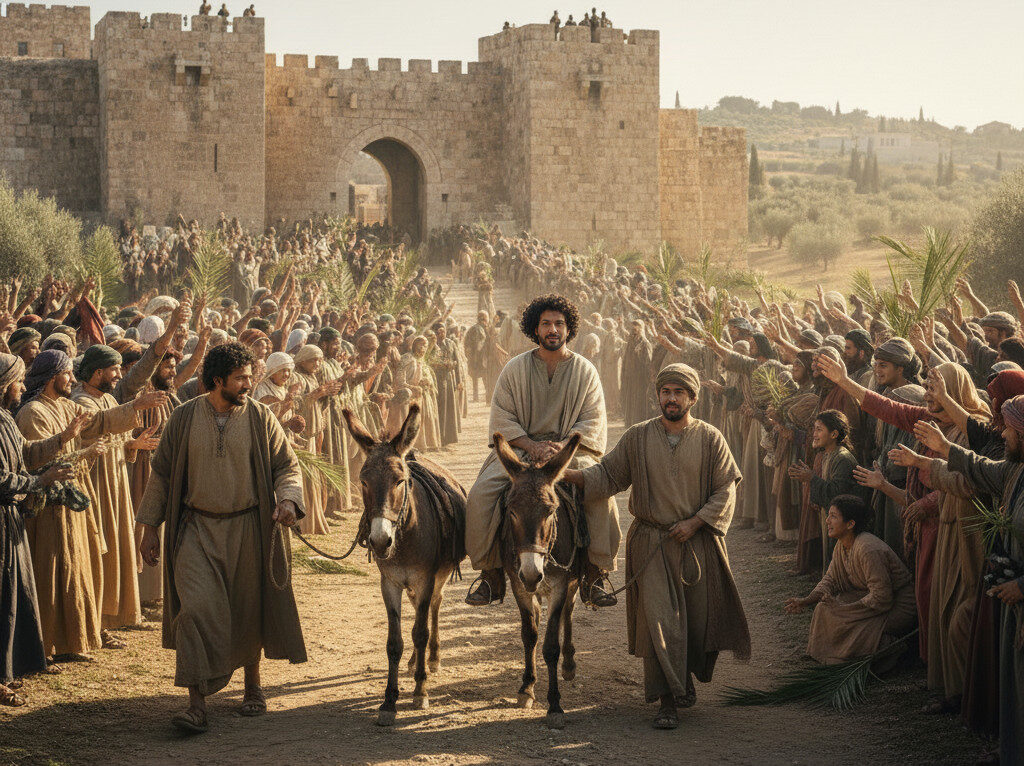Ezekiel 37:15-28 and Elements of God’s Future Promises to Israel
By Dr. Keith Kobelia / January 30, 2026
The Prophet Ezekiel was called to an unusual but important ministry to the captives of Judah in Babylon. Despite his unusual methods (e.g., symbolic acts) and extraordinary visions (e.g., Ezek...
Read More
Why the Promises to Israel Matter Today
By Dr. Daniel Brown / November 15, 2025
Fulfilled Messianic Prophecies from the Book of Zechariah
By Dr. Keith Kobelia / September 15, 2025
Among the most intriguing prophetic sections of the Bible are the prophecies of Zechariah which are contained in the book that bears his name. Zechariah is teeming with Messianic prophecies,...
Read More
The Virgin in Isaiah 7:14
By Dr. Timothy A. Little / July 1, 2025
INTRODUCTION According to the Gospel of Matthew, the virgin Mary was found to be with child of the Holy Spirit. Jesus the Messiah was miraculously conceived, and, several months later,...
Read More
1 Reply
{"slides_column":1,"slides_scroll":1,"dots":"true","arrows":"true","autoplay":"true","autoplay_interval":"5000","speed":"1200","lazyload":""}
Evangelistic Preaching and Giving Invitations
Posted on by Dr. Robert Domokos
Evangelistic Preaching is a legitimate style of preaching that can and should be used today. Evangelistic preaching is not mere emotionalism. It is not a string of sad stories. It is not what some would call exceptional Christian salesmanship. And, it need not be used exclusively. Preachers must preach the whole counsel of God.
There should be no question that the content of preaching should be the Word of God. The Scriptural content of a sermon is that which gives it life, substance and vitality.
Evangelicals and the Doctrine of Eternal Punishment
Posted on by Dr. George Houghton
Historically, the major Christian denominations have taught that those who die outside of Christ will suffer eternal punishment in hell. Many religious leaders today either deny this or aren’t sure. While a denial of hell has been a characteristic of theological liberalism and of the cults, its de-emphasis and denial are now the positions of noted evangelical leaders as well.
The late 1960s and early 1970s saw a new Statement of Faith adopted and published by Fuller Theological Seminary in which the old Statement’s language of Christ “assigning unbelievers to eternal punishment” was changed to state that “the wicked shall be separated from God’s presence.”
Pastoral Direction and Congregational Motivation
Posted on by Dr. Robert Domokos
One of the factors that contributes to spiritual and numerical growth in a congregation is that of the direction given by the pastor. Perhaps we need a new pastoral determinism in our churches today. There appears to be a great deal of wishing and hoping, but little wise planning. I’ve heard some of the expressions (and I have used some myself) such as, “We need new blood in this church. We need more motivation. We need new programs. We need a shot in the arm.
Followers of Faithful Men
Posted on by Dr. Robert Domokos
Two verses of scripture from Hebrews have been used and perhaps sometimes misused in the context of spiritual followership. Hebrews 13:7 reads, “Remember them which have the rule over you, who have spoken unto you the word of God, whose faith follow, considering the end of their conversation.”
An understanding of this verse is vital to our appreciation of leadership and followership.
We are reminded that a leader has the responsibility of providing direction. He is told that he is to rule.
Faith Baptist Seminary…A Distinctive Graduate School!
Posted on by Dr. Elvin K. Mattison
“Seminaries are all alike. They all prepare students for Christian ministries, so it really makes little difference where you attend seminary.” These statements represent the way some people respond to the idea of seminary training. It is true, seminaries do have many things in common and yet they are very distinct from one another.
You do not choose a seminary because of location but because of its distinctives that will meet your academic and ministry goals. All seminaries are the same in that they are graduate schools, dedicated to preparing men and women for Christian ministries.
The Pastor—Scholar
Posted on by Dr. Ralph G. Turk
A New Testament pastor must be a theologian. He must also be a scholar. Both of these ideas suggest to the casual reader, a man of God who is a bookworm and out-of-touch with reality. Quite the opposite is true.
The pastor’s mandate is to preach the Word (2 Timothy 4:2). This assumes that he accepts the Word is from God Himself in every detail, and that he must proclaim it exactly as God intended it. Rightly understood, then, theology and scholarship move the preacher in the direction of God and His Word, not away from it.
Is Rosenthal Right About the Rapture?
Posted on by Dr. Manfred Kober
A long time ago, Solomon opined that “of the making of many books there is no end” (Ecc. 12:12). If this was true in the 10th century before Christ, it is even more true in the 20 th century after Christ. Prompted by the volatile world situation, there is especially a proliferation of prophetic publications. Most books have little impact. Not so one recent book, The Pre-Wrath Rapture of the Church (Nashville: Thomas Nelson Publishers, 1990). This all-out attack on the pretribulational rapture position is making a splash on the theological scene.
Resurrection, Christ’s and Ours
Posted on by Dr. Myron J. Houghton
Introduction
Traditionally, those who claimed to be Christians professed to believe in the bodily resurrection of Jesus Christ and in the bodily resurrection of all who die. The Apostles Creed states, “I believe in Jesus Christ, He suffered under Pontius Pilate, was crucified, died, and was buried. On the third day he rose again.” This Creed further states, ” I believe in the resurrection of the body.” However, higher criticism has caused many to doubt or deny the bodily character of the resurrection, and even among those who are considered to be evangelical opinions differ concerning the meaning of “I believe in the resurrection of the body.”
Biblical Preaching in the Twentieth Century
Posted on by Dr. Elvin K. Mattison
Preaching is foremost in the minds of those who teach homiletics classes. They love to preach, and they like to talk about preaching. Such was the case recently as another teacher of homiletics and I met for breakfast to discuss how to be more effective in the classroom. Our conversation was side-tracked from methodology as we began to deal with the dearth of expository preaching today. This weakness is readily observable in many recent books on homiletics. The emphasis is away from exposition to “inductive” or “life experience” preaching.
Jesus’ Birth…An Act of God or an Accident of Man
Posted on by Dr. Elvin K. Mattison
Understanding the “how” of Jesus’ coming into this world has been the subject of discussion since the time of Paul the Apostle. Every generation has made an attempt to explain His birth in human terms rather than a miraculous act of God. One school of thought supposes that Joseph and Mary entered into an intimate relationship before their marriage rites were completed and Jesus was born as a result of that action. More recently liberal theologians have speculated that Mary and a German soldier engaged in immoral activity that produced Jesus.



